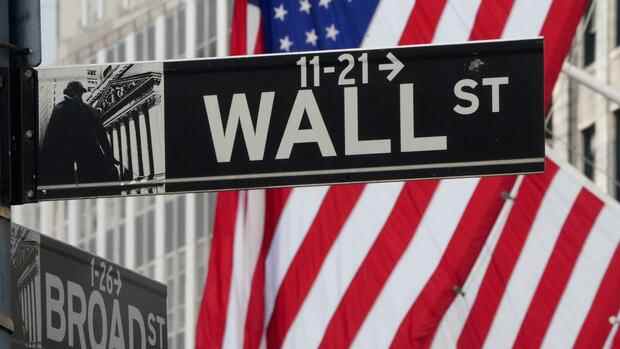Dusseldorf The US stock market cannot repeat the strongest stock market week since 2020. The important indices were already in the red at the start of trading. After US Federal Reserve Chairman Jerome Powell said that countermeasures had to be taken quickly in the fight against skyrocketing inflation, the indices plummeted.
The market-wide leading index S&P 500 is 0.7 percent lower at 4432 points on Monday after gaining more than six percent in the previous week. That was the best weekly performance since November 2020.
The other two major indices also fell on Monday: the Dow Jones Industrial of the standard stocks lost 1.1 percent, the index of the Nasdaq technology exchange fell by 1.4 percent.
Speaking at an Association for Business Economics (NABE) event on Monday, Powell pledged to take more aggressive action on inflation if necessary. “The job market is very strong and inflation is way too high,” he said. “There is an obvious need to act swiftly to return the monetary policy stance to more neutral levels.”
Top jobs of the day
Find the best jobs now and
be notified by email.
The central bank completed the turnaround in interest rates last week and raised the key monetary policy rate by a quarter of a point to the new range of 0.25 to 0.50 percent. It was the first rate hike in three years. “If we decide it’s appropriate to move more aggressively by raising interest rates by more than 25 basis points in one or more meetings, we will do so,” Powell said.
“Today is just digesting what happened last week and the market is trying to figure out whether or not this recovery is sustainable,” said Robert Pavlik, portfolio manager at Dakota Wealth Management.
Hopes for a diplomatic solution and lower valuations are attracting investors. This can be seen, among other things, in the technical fear and greed indicator of the S&P 500, which has risen to 35 percent and has thus left the extreme fear area of the previous week of 15 percent.
However, many investors remain cautious. The put/call ratio of institutional investors on the CBOE futures exchange is at a neutral level. Among US private investors, 50 percent are pessimistic (bearish), only 22.5 percent are optimistic (bullish). The bull-bear ratio shows a strong overhang of the bears at minus 27 percent.
Rising yields in the bond market
The yield on the two-year US Treasury bond rose above the 2 percent mark on Monday for the first time since May 2019. Yields on securities, which are more sensitive to Federal Reserve policy changes than longer-dated securities, rose almost nine basis points to 2.02 percent. At the beginning of March, this value was still 1.3 percent.
“We’re seeing two-year yields reacting fairly quickly to market expectations of more rate hikes,” Greg Faranello, head of US rates trading and strategy at AmeriVet Securities, told Bloomberg. As companies look to lock in current interest rates, “the stars are pointing in the right direction for a breakout to the upside in long-term yields. Oil prices continue to rise, inflation will not fall and monetary tightening will come.”
The 10-year Treasury yield rose to 2.24 percent and the 30-year Treasury to 2.48 percent. They were just below the highs seen last week, when the Fed raised interest rates for the first time since 2018.
>> Read about this: Yields rise significantly: “Multiple blows to the neck” for interest-bearing securities
Look at the individual values
Among the winners on Monday were oil stocks such as Occidental Petroleum and Marathon Oil, which rose 10 percent and 7 percent respectively. They benefited from the rising oil price. Shortly after the start of trading in New York in the afternoon European time, a barrel of the US variety WTI cost almost six percent more than the previous day.
Boeing: The aircraft manufacturer’s shares have fallen by more than five percent. The trigger is the crash of a China Eastern Airlines passenger plane in the mountains of southern China with 132 people on board. According to Flightradar24, the plane involved in the accident was a six-year-old Boeing 737-800, a predecessor of the 737 MAX.
Allegany: Warren Buffett’s investment firm Berkshire Hathaway plans to buy US insurance holding company for $11.6 billion. Berkshire is offering shareholders $848.02 per share, the company said. Alleghany shares then rose by almost 25 percent to $845.
Guess: An additional $175 million accelerated share repurchase has encouraged investors to buy into the denim fashion company. Guess shares rose by around two percent. The company says it has repurchased $378 million, or 28 percent of its share capital, in the past three years.
Nielsen: A rejected takeover bid brings Nielsen the biggest price drop in three and a half years. The shares of the investigator of TV ratings fell by around ten percent. According to a consortium of financial investors, the company offered $25.40 per share. The Board of Directors unanimously rejected this as too low.
More: Buy, sell or sit out? How investment professionals position themselves in times of crisis
